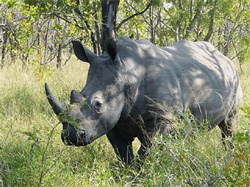
Top stories






More news


Marketing & Media
Ads are coming to AI. Does that really have to be such a bad thing?














South Africa has lost a total of 262 rhinos to illegal killings since the beginning of this year and 173 individuals have been arrested in connection with rhino poaching.
Targeted provinces include Limpopo, Mpumalanga, North West and KwaZulu-Natal, which collectively account for 100 poached rhinos.
The department said South Africa would continue all its efforts locally and internationally to address the on-going scourge.
Environmental Affairs Minister Edna Molewa has amended the norms and standards for the marking of rhinoceros and rhinoceros horns, and for the hunting of rhinoceros for trophy hunting purposes to strengthen requirements relating to hunting.
The amended norms and standards came into effect on 10 April 2012 and include, among others, that the applicant must submit certain information to the issuing authority.
This information includes proof of membership of a hunting association in the country of usual residence of the hunting client. The hunting association must be recognised by the government of the country of residence of the hunting client; a curriculum vitae indicating his/her hunting experience in his/her country of usual residence and proof of previous experience in the hunting of any African species.
"These requirements enable the issuing authorities to determine whether the applicant is a bona fide hunter," said the department.
The issuing authority must also consider whether the country of usual residence of the hunting client, where the rhinoceros horn and the rest of the trophy will be imported to, has adequate legislation to ensure that the rhinoceros horns and the rest of the hunting trophy will be used for the purpose as indicated on the permit.
The department has recommended to all provincial conservation authorities, responsible for the issuance of hunting permits, to refuse all applications for white rhinoceros hunting by foreign hunters whose state of usual residence is Vietnam.
This will be in place until Vietnam has confirmed, in writing, that all rhino trophies exported since 2010 are still in the possession of the hunters.
The CITES Management Authority in Vietnam informed the department and the CITES Secretariat that they were undertaking this process. A list of permits endorsed at OR Tambo has been provided to Vietnam.
According to the department, since these measures have been implemented, the number of applications for hunting has declined and no further applications from the alleged consumer states of China, Vietnam, and Thailand have been received.
Currently, all hunting applications are submitted to the Department of Environmental Affairs to verify whether the applicant has hunted a rhino within the specific calendar year.
According to the norms and standards, a hunting client may only hunt one white rhinoceros within a specific calendar year.
Delivering the department's Budget Vote earlier this year, Molewa told Parliament that she planned to engage stakeholders with a view to reaching national consensus on proposals relating to international trade in CITES listed species.
This includes discussions with major role-players on whether or not to approach the international community with a proposal to trade in rhino horn. The final recommendations from the stakeholder engagement process are expected in September.
The department appointed a Rhino Issue Manager to coordinate stakeholders' inputs through dialogues.
The first workshop took place in Midrand on 30 May. It drew a diverse range of stakeholders consisting of conservation authorities, scientists, NGOs and private game farmers, amongst others, who contributed constructive comments for the way forward.
The CITES Standing Committee noted that rhino poaching and illegal trade in rhino horns was a global phenomenon, which was also occurring in the Democratic Republic of the Congo, India, Mozambique, Nepal and Zimbabwe.
South Africa's experience and intervention measures in fighting the illegal trade were well received and other member states affected by the same problem were encouraged to follow suit.
CITES further appealed to alleged consumer states to further improve controls and enforcement relating to the illegal trade in rhino horns.
Other interventions being implemented to resolve the rhino poaching problem include on-going bilateral consultations with consumer countries such as Peoples Republic of China and the Socialist Republic of Vietnam.
The minister is holding on-going bilateral discussions with Mozambique, which has since made a pledge to tighten its security and elevate some offences to receive more severe penalties.
South Africans can report incidents of rhino poaching or any tip-offs that could lead to arrests and prevention of illegal killings to 0800 205 005.
SAnews.gov.za is a South African government news service, published by the Government Communication and Information System (GCIS). SAnews.gov.za (formerly BuaNews) was established to provide quick and easy access to articles and feature stories aimed at keeping the public informed about the implementation of government mandates.
Go to: http://www.sanews.gov.za